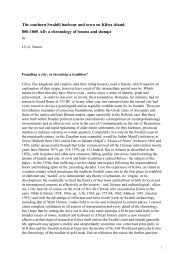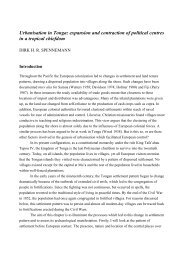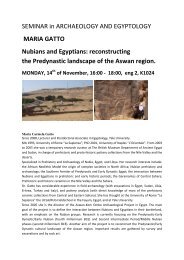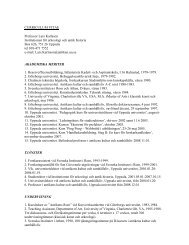Beowulf - Institutionen för arkeologi och antik historia
Beowulf - Institutionen för arkeologi och antik historia
Beowulf - Institutionen för arkeologi och antik historia
You also want an ePaper? Increase the reach of your titles
YUMPU automatically turns print PDFs into web optimized ePapers that Google loves.
Their peaceful role in general and the fact that they have been deprived of their<br />
social origin is a handicap in the goodness game. Ultimately it is their complementary<br />
relation with their husband and the fact that they are withdrawn from the public that<br />
make it difficult and perhaps impossible for upper-class women to be or to become<br />
good.<br />
From a formal point of view it can be argued that since the wife or the queen has<br />
already reached the state of being complementary to her husband, there is no need<br />
either for her or for him to be good to each other. They are past that stage in life. The<br />
social sphere of women becomes unreasonably narrow in this perspective and for a<br />
modern mind it is obviously difficult to accept that a sword or tactics are more likely<br />
to be good than women. Nonetheless, <strong>Beowulf</strong> applies tactics which make it possible<br />
for matter to behave in accordance with the ideal of the good and men and<br />
swords meet each other, so that they may engage themselves in the goodness game.<br />
It is, moreover, easy to imagine that now and then a sword gives us its unconditional<br />
support when we strike our blow, and also to feel that this support is the result of the<br />
care and goodness we have bestowed upon it.<br />
Goodness is a matter of civilised action, and the good verify themselves through<br />
their actions. It is characteristic of the society that there is a latent need for someone<br />
to take action in order to solve some problem or other. The good should take some<br />
of the initiative to solve the problem in a way that corresponds to the end product of<br />
the good, namely the peaceful society. It is thus not for one person to decide what is<br />
the good action in a given case. If goodness cannot be discussed as in <strong>Beowulf</strong>,<br />
follow an administrative line as in the Lupus case or be taken for granted as in<br />
Byrhtnoth’s situation, then the good cannot take action. This shows itself in a most<br />
subtle way when Vifil asks for Aud’s generosity, since the very asking a favour or<br />
demanding it, as Vifil does, results in conflict. Instead of bringing friendship into the<br />
picture or a new contract of goodness between Aud and Vifil it brings up a quarrel<br />
between Vifil and his superior Hord, who is Aud’s shipmate. Whether on purpose or<br />
not, the story tells us that women are not good, since they cannot form contracts of<br />
social goodness.<br />
The point is that we are allowed to be good only when the good actions are the<br />
result of a social contract based on the free will of members of the same sex. Even in<br />
cases where it ought to be fairly obvious what is good and what is not good, decisions<br />
may be difficult to reach. Wealhtheow hopes that Hrodulf will remember the<br />
good done to him in his youth and pay it back to the Queen’s children, her sons, if<br />
Hroðgar should die, but these very hopes suffice to tell us that there may be competing<br />
relations of goodness which could lead to the death of her sons.<br />
It is characteristic of the good action that it is a contract imposed upon a man by<br />
his superiors, but also that he may himself engage his inferiors in another similar of<br />
contract. A contract must be honoured, but within the upper classes a lack of goodness<br />
does not lead to a man being defined as evil; instead the man loses honour. In<br />
152








